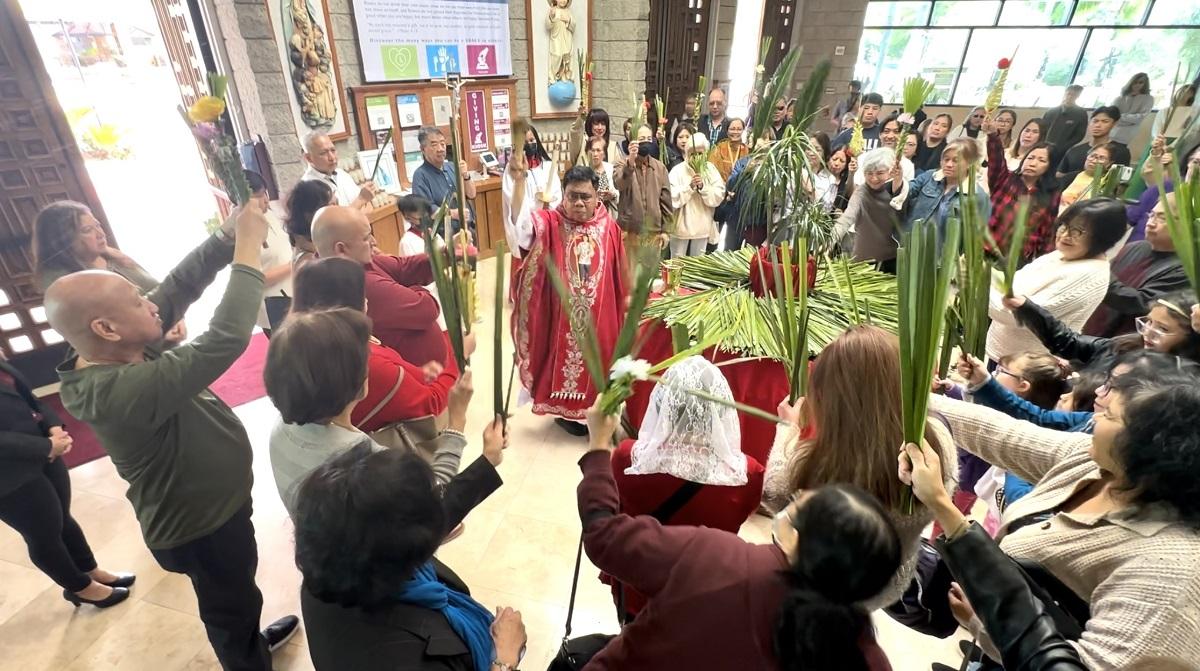Pinoys in US keep traditions alive during Holy Week
IN HEARTS AND DEEDS Published March 29, 2024 8:09am LOS ANGELES, California — For Filipino immigrants here, life goes on even in the season of Lent. They go to beaches, visit winter parks, even though there is no suspension of work because, unlike in the Philippines, Lent is not considered a holiday here. So, how […]


IN HEARTS AND DEEDS
LOS ANGELES, California — For Filipino immigrants here, life goes on even in the season of Lent. They go to beaches, visit winter parks, even though there is no suspension of work because, unlike in the Philippines, Lent is not considered a holiday here.
So, how do Filipino-Americans spend their time here during the Holy Week?
For many Filipinos based overseas, it does not matter where they live as they carry along their customs and religiosity wherever they go.
“Since we started the Alhambra Cell Group, dumadami na ang youth namin dahil may mga bagong migrated dito (our youth members increase because of new migrants),” said Nancy Villano, one of the youth coordinators of the El Shaddai Cell Group at the All Souls Parish in Alhambra, California.
“We let them be active, so we started it by letting them host or lead the praise and worship every first Thursday of the month.”
Villano said she gets inspired to do more when she observes them grow in faith.
“Nadi-develop na ang spirituality nila tapos nai-empower na ‘yung spiritual gifts nila (they develop their spirituality and empower their spiritual gifts),” she said.
While recent surveys commissioned by the US bishops showed a downtrend in church attendance among Catholic Americans, there was a noted uptick in attendance among Catholic youth led by the so-called millenials.
Members of Alhambra Cell are proud to say that they are up to the challenge in imparting to their kids the faith that they have grown up with.
“You know, I let the children observe fasting and abstinence. Kaya alam nila na (so they know), Oh mom, we cannot eat meat. They also choose something na they will have to abstain from. Yon na rin ang kanilang parang (that is their) sacrifice for Lent,” said Carlota Sta. Ana, who traces her roots from San Pablo City in Laguna.
For Harry del Pilar, another Filipino based in the US, some Lenten rituals evoke hometown memories.
“Sa atin kasi, Katoliko o Kristyano, malaking impact sa buhay ko, sa aking pagkatao kasi mula sa pagkabata especially sa amin sa Burauen (sa Leyte), sa probinsiya, kinalakihan natin lalo na pag dumarating ang Biyernes Santo. Walang pasok ‘yan, walang pasok. So malaki talaga ang pagkakaiba nang mapunta ako dito sa Amerika. Kasi dito, una, maraming relihiyon. Tapos ang gobyerno wala ng pakialam sa cuaresma, sa Biyernes Santo. May pasok dito, may opisina,” he shared.
(The Lenten traditions, especially on Good Friday, have a big impact in my life, especially since I grew up observing them in Barauen in Leyte. There’s no work during Good Friday unlike here in America, where there are many religions and the government does not care about Lent or Good Friday.)
Del Pilar said he particularly misses the passion play or the Senakulo on Good Friday.
Fr. Thomas Asia of St. Martha’s Church in West Covia agreed, and pointed out the significance of the ultimate reason why Catholics do sacrifices during Lent.
“Sa mga susunod na araw kung saan pagninilayan natin ang paghihirap ng Diyos, ay puwede nating ihalintulad sa paghihirap natin sa pagpunta sa ibang bansa. Minsan ang comfort natin, kailangan nating ialay na sakripisyo para sa mga taong mahal natin,” he said.
(In the next few days when we remember the Lord’s sacrificies, we can compare our own sacrifices in moving to another country. Sometimes we have to sacrifice our own comfort for our loved ones.)
Asia said ultimately Filipinos survive in a foreign land because of their faith and their families.
“Ganoon din naghirap ang Diyos. Kung naghirap ang Diyos dahil gusto lang niyang maghirap, sayang naman. Pero naghirap ang Diyos dahil nagmahal siya, nagkaroon ng kahulugan. Nong mamatay ang Diyos sa krus, hindi lang basta siya nawalan ng hininga… siya ay nag-alay ng buhay para sa mga taong mahal niya,” he said.
(The Lord suffered, and His suffering had meaning. He suffered because He loved. When the Lord died on the cross, He didn’t just lose breath but He offered his life to the people He loved.) —KBK, GMA Integrated News














